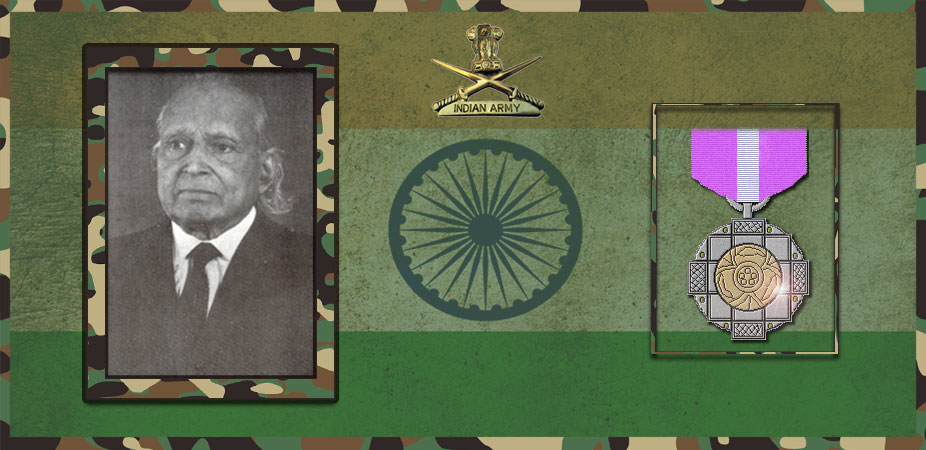Let's salute to our Indian Army together, We are proud to be Indian.
Let's salute to our Indian Army together, We are proud to be Indian.

Raman Viswanathan (1899–1982) was an Indian chest physician, medical mycologist and pulmonologist, considered by many as the father of Chest Medicine in India.He was the founder director of Vallabhbhai Patel Chest Institute, a postgraduate medical institute based in Delhi. An elected fellow of the American College of Chest Physicians, Royal College of Physicians of London, Indian National Science Academy and the Academy of Medical Sciences, United Kingdom, he was a recipient of several honors including the Forlanini Medal by Italian Tuberculosis Association and the Eugeno Morelli Prize of the National Academy of Sciences, Italy.The Government of India awarded him the third highest civilian honour of the Padma Bhushan, in 1974, for his contributions to medicine
R. Viswanathan was born on 8 September 1899 in Nagarcoil, in the southern tip of India in the state of Tamil Nadu to a government official in the erstwhile Travancore state as the youngest of his two children.After losing his mother at the age of nine, he stayed with his elder sister’s family and did his schooling in Nagarcoil. Later, he secured his graduate degree with honours in Science and English literature from the Maharaja’s College (present-day University College Thiruvananthapuram) of the University of Madras in 1921 after which he graduated in medicine from Madras Medical College in 1926.Continuing at the same institution, he passed MD in 1931 and became a member of the Royal College of Physicians of London, the next year. During this period, he also worked as an Assistant Professor of Medicine at Madras Medical College but moved to Andhra Medical College, Visakhapatnam in 1934 as the Professor of Clinical Medicine, where he worked till 1941. In between, he took a hiatus from work and obtained Diploma in Tuberculosis Diseases(TDD) from Cardiff University School of Medicine, Wales, UK, in 1938.When World War II broke out, he joined Indian Armed Forces in 1942 as an Officer-Commanding of the Medical Division and served as a Medical Specialist and adviser.After the war, he retired from the Army and joined the Union Government and worked in various capacities such as an adviser on Tuberculosis (1946–48) and as the Deputy Director General of Health Services (1948–57).He was also associated with the University of Delhi during this period, as the head of the Department of Medicine and as the Dean of the Faculty of Medical Sciences.
During his tenure with the Government of India, Viswanathan was appointed as the director of Vallabhbhai Patel Chest Institute (VPCI) when the institution was established in 1953.He served as the honorary director till 1957 and continued as a full-time director till his superannuation in 1964.Post his regular career, he was made the Honorary Professor of VPCI and the Emeritus Scientist of the Council of Scientific and Industrial Research (CSIR) and held both the posts till his death, involving himself in research, in post graduate medical education, in organizing medical conferences or delivering keynote addresses at various conferences in India and abroad. He also served as the Honorary Research Director cum Consultant at the Rajendra Memorial Research Institute of Medical Sciences, Patna and as a visiting professor at the University of Illinois (1958) and the University of Chicago, (1964).
Viswanathan was married to Sharda, a gynecologist at the Government Hospital, Delhi, and the couple had two children; his son, V. Raman, was a public health engineering scientist and the daughter, V. Kamla, a homemaker. He died on 14 July 1982, at the age of 82
Viswanathan, a founder fellow of the National Academy of Medical Sciences (1964) and an honorary physician to the President of India, was an elected fellow of the Indian National Science Academy (1968), National College of Chest Physicians (India), Royal College of Physicians of London (1980), American College of Chest Physicians (1947) and Academy of Medical Sciences.He was a member of such medical societies as American Thoracic Society, the British Thoracic Society, Indian Association of Pathologists, Associations of Physicians of India and Indian Medical Association.The National Academy of Sciences, Italy awarded him the Eugeno Morelli Prize in 1969 and the Italian Tuberculosis Association followed suit with its Forlanini Medal. He received the Dhanwanthari Prize of the Indian National Science Academy in 1971. Three years later, the Government of India included him the 1974 Republic Day Honours list for the third highest civilian award of the Padma Bhushan.
After his death in 1982, Vallabhbhai Patel Chest Institute renamed the main hospital complex as Viswanathan Chest Hospital in honor of its founder director. National Conference on Pulmonary Diseases (NAPCON) has instituted an annual oration, Prof. Raman Viswanathan Memorial Chest Oration, in his honor; the 2015 lecture was delivered by noted pulmonologist, S. K. Katiyar. Candida viswanathii, a yeast species and a common pathogen causing fungal infections, is named after him. His life has been documented in his autobiography, While the Light Lives – Reminiscences of a Medical Scientist,as well as in an article, Dr. R. Viswanathan : a profile, published in the Indian Journal of Chest Disease and Allied Science, the official journal of Vallabhbhai Patel Chest Institute and the National College of Chest Physicians.